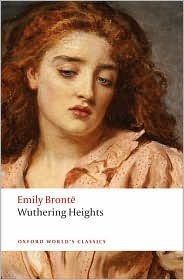kdwarn reviewed Wuthering Heights by Emily Brontë by Emily Brontë
None
3 stars
Over-rated just a bit?

Paperback, 330 pages
English language
Published 2008 by Oxford University Press.
Catherin Earnshaw's passionate declaration is the focus of a novel in which relations between men and women have never been more powerfully depicted. When young Heathcliff comes to live at Wuthering Heights he forms an intense bond with Catherine, who loves him but cannot tame his rought and uncouth ways. When she seems to spurn him, Heathcliff plans a terrible revenge on Edgar Linton, the man who has usurpted him, and on everyone connected with Linton. Only through the next generation can the promise of redemption be encatcted.
Emily Bronte's extraordinary novel has a haunting intensity forever linked with the grave-defying passion of Catherine and Heathcliff. Its ingenious strucuture, vivid evocation of landscape, and startling depction of men and women at their most depraved and exalted, have given it a unique place in English literature. This edition explores the novel's many interpretations and reproduces the authoritative Clarendon text. (back cover)
Over-rated just a bit?
Over-rated just a bit?
I admit it. I picked up this book when I was 19 because my mother said, "I can't relate to Catherine because she's too willful!" and she always called me willful, too. ;)
Emily's sisters were both Victorian social novelists, but Emily was a Romantic--as in Romantic poet, not as in Romance novel. I make that distinction because I don't think we're supposed to sigh over Heathcliff and Catherine, I think we're supposed to see something that would be natural and positive if it hadn't been blasted and twisted into something dark by the social pressures that kept them apart.
One of the things I like about this novel is the way Emily wasn't afraid of ambiguity, the way she would build up something as being possibly supernatural and then carefully pull that possibility apart, unravel it so that it's all up to the reader. She's also not afraid of …
I admit it. I picked up this book when I was 19 because my mother said, "I can't relate to Catherine because she's too willful!" and she always called me willful, too. ;)
Emily's sisters were both Victorian social novelists, but Emily was a Romantic--as in Romantic poet, not as in Romance novel. I make that distinction because I don't think we're supposed to sigh over Heathcliff and Catherine, I think we're supposed to see something that would be natural and positive if it hadn't been blasted and twisted into something dark by the social pressures that kept them apart.
One of the things I like about this novel is the way Emily wasn't afraid of ambiguity, the way she would build up something as being possibly supernatural and then carefully pull that possibility apart, unravel it so that it's all up to the reader. She's also not afraid of being ugly and dark and sick, and devoid of socially redeeming value.
It's also an interesting book structurally--sort of a first person narrative inside a first person narrative, and neither narrator is reliable.



















































